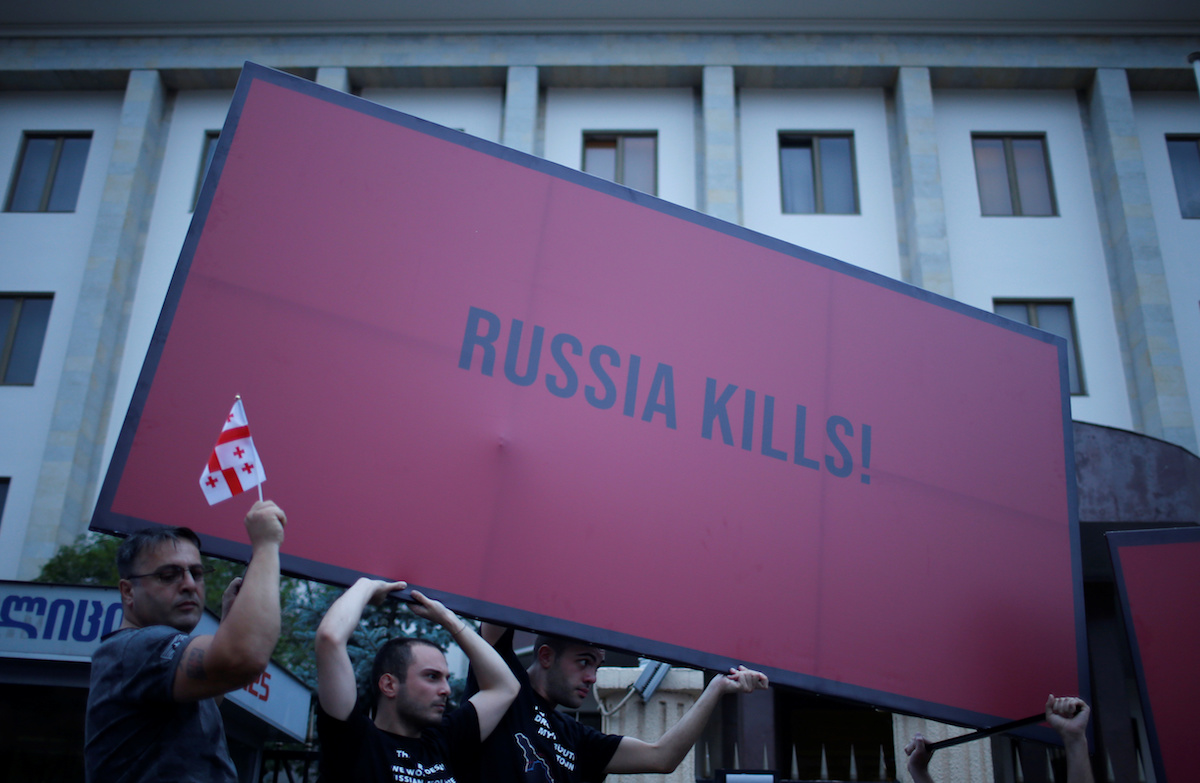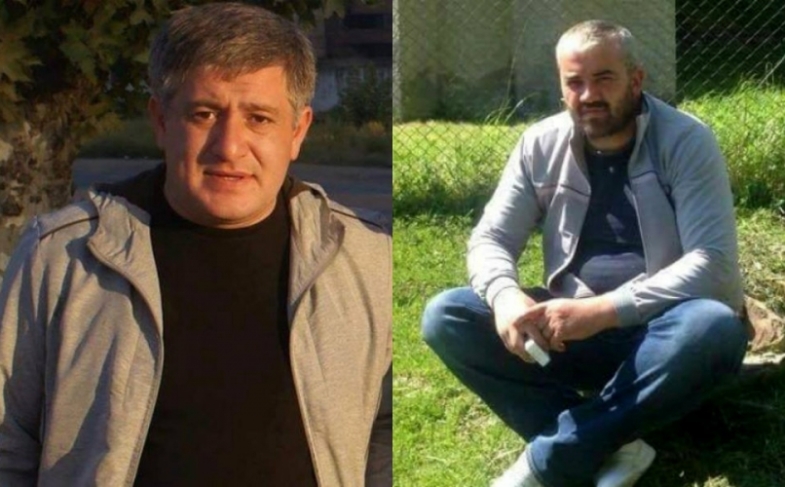Georgia files two lawsuits with the European Court of Human Rights against Russia

Two lawsuits have been filed with the European Court of Human Rights (ECHR) against Russia. The first of the two is an interstate suit filed by Georgia’s Ministry of Justice, while the second is an individual claim filed by the parents of the late Archil Tatunashvili, Giorgi and Rusudan Tatunashvili.
_____________________
Georgia v. Russia
According to the Ministry of Justice, the purpose of the interstate lawsuit is to address ‘the administrative practice of mass infringement of rights, detentions, assaults and killings of Georgian citizens in territories occupied by Russia and along the occupation line. This has intensified after the 2008 war and reached a critical point in February this year when Archil Tatunashvili was tortured and murdered’.
Georgia is demanding that the ECHR establish Russia’s accountability for violating several articles of the European Convention on Human Rights. Georgia claims that by occupying territories, installing barbed wire and targeting the citizens of Georgia, Russia violates such articles of the European Convention as the right to life, the prohibition of torture, the right to freedom and security, the right to privacy and family life, as well as the right to property and freedom of movement.
The Ministry of Justice further says that these violations are aggravated by the fact that they have a discriminatory motive and that ‘they aim to intimidate and infringe on the rights of ethnic Georgians in order to prevent the return of the Georgian population to Abkhazia and the Tskhinvali region’. Supporting evidence was submitted to the court along with the claim.
The lawsuit strongly revolves around the cases of Archil Tatunashvili, Giga Otkhozoria and David Basharuli. As part of the suit, the Ministry emphasizes that some of the individuals responsible have already been identified, but Georgia has no way to bring these perpetrators to justice.

- Archil Tatunashvili was a Georgian citizen who died in Tskhinvali under suspicious circumstances;
- Giga Otkhozoria was a Georgian citizen killed on the administrative border between Georgia and Abkhazia by an Abkhaz border guard. A separate claim by Otkhozoria’s family against Russia has already been submitted to the ECHR;
- David Basharuli was taken in June 2014 by police officers to a station in Akhalgori, a town controlled by the de facto authorities of South Ossetia. After this, the 19-year-old’s family members and relatives searched for him but was unsuccessful. He was found dead in a forest on 4 January 2015.
- In March, the Georgian parliament adopted the Otkhozoria-Tatunashvili List, similar to the Magnitsky List that the US adopted in response to Russian crimes. The main goal of the Georgian list is to protect the security of Georgian citizens in occupied territories. Since the Georgian authorities do not have levers to protect Georgian citizens in the occupied territories, those who proposed the idea hopes that a ‘blacklist’ of those complicit in these offences would be a step towards remedying the situation.
The claim asserts that Georgia was not given the opportunity to investigate the case of Archil Tatunashvili:
“So far, the scene of the incident has not been inspected. Representatives of the occupation regime actually refuse to hand over the internal organs, mobile phone and clothes of Archil Tatunashvili worn at the time of torture and death. It is impossible to interrogate the witnesses who live in the territory of the occupied Tskhinvali region and have important information on the matter. It is also impossible to arrest the perpetrators, since they are in the occupied territory.”
The Ministry of Justice says that a full investigation is impeded both by the Russian Federation and the de facto territories it controls.
• This is the third interstate lawsuit between Georgia and Russia in the Strasbourg Court. The first case concerned deportation of citizens of Georgia from Russia. The case ended in a victory for the Georgian side.
• The second case regarding the 2008 war is still awaiting a decision.
Tatunashvili Family v. Russia
The second suit against Russia was launched independently by Giorgi and Rusudan Tatunashvili, the parents of Archil Tatunashvili, who died in Tskhinvali under suspicious circumstances.
Georgian citizen Tatunashvili was detained on 22 February 2018 by representatives of the de facto authorities of South Ossetia, and died the next day in Tskhinvali. The Ossetian side claimed that the 35-year-old ‘fell down the stairs of the detention centre on 23 February at night, and died from heart failure in a Tskhinvali hospital’.
Neither Tbilisi nor the Tatunashvili family believe this version of events. These doubts were further fueled by Tskhinvali’s refusal to transfer Tatunashvili’s body to Georgia for almost a month. After the body was eventually transferred, an autopsy found that several internal organs were missing. The examination also found signs of torture.
The claim submitted to the court on behalf of the Tatunashvili family was prepared by the Empathy Centre NGO. In an interview with Radio Liberty, representatives of the NGO explained that, according to international standards, the parents of a person who died from torture are considered not only as the legal representatives of the deceased, but also as victims of torture themselves. According to the lawsuit, 300 thousand Euros were claimed in compensation, ‘but the money means nothing to the family’, stated the organization’s members.
The suit accuses Russia of violating five articles of the European Convention: the right to life, the prohibition of torture, the right to freedom and inviolability, the right to respect for private and family life and the right to effective legal protection.
The main evidence in the case is an official conclusion drawn up by commissioned forensic expertise from the Empathy Centre.
The conclusion was prepared in accordance with international standards, including the Istanbul and Minnesota protocols on torture. Two experts of international standing were also involved in the preparation of the document.
The document confirms that Archil Tatunashvili was brutally tortured in Tskhinvali and that this was the cause of death. Accordingly, representatives of the Empathy Centre are confident in the final success of the claim brought to the Strasbourg Court.
How long will it take?
In order to start considering the case, the European Court for Human Rights must first accept the claims that Georgia has filed. Even if this happens in a short time, no one can say for sure what time frame is required for a substantial review of the case.
However, considering prior claims, the process will more than likely take years. For example, Georgia submitted an interstate lawsuit regarding the August 2008 war to the Strasbourg court on 11 August 2008. The Grand Chamber held its final hearing almost 10 years later on 23 May 2018. The decision is still unknown.
Georgia has also been waiting eight to nine years for numerous individual suits related to the August war to be considered, including a lawsuit filed on behalf of the children of Giorgi Antsukhelidze, a National Hero of Georgia.
The Empathy Centre is convinced that the interstate lawsuit of the Ministry of Justice is very important for the success of the individual claim in the Tatunashvili case.



















